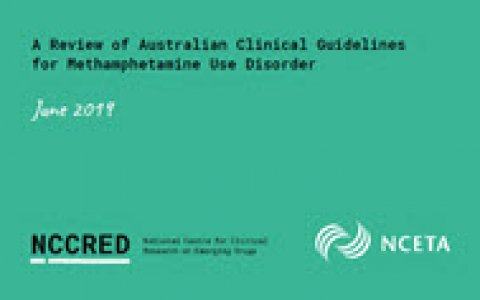Review of Australian clinical guidelines for methamphetamine
NCETA was engaged by the National Centre for Clinical Research on Emerging Drugs (NCCRED) to work with them to review Australian methamphetamine-related clinical guidelines. This research:
- Identified Australian methamphetamine-related clinical guidelines
- Mapped guideline content for treatment settings and the populations they covered
- Assessed guidelines against contemporary guideline criteria
- Identified gaps and implications for future guideline development.
Twenty-seven methamphetamine-related clinical guidelines were identified, some of which solely addressed methamphetamine (or stimulants) specifically, while others were generic but had component parts of relevance. The list of 27 guidelines including a brief description and link to each guideline is available from the NCCRED website along with several Australian and international methamphetamine resources that AOD clinicians can also use.
In conducting the guideline audit, NCETA developed:
- A purpose-built analytic framework to map each guideline according to treatment setting and target population
- A modified version of the Appraisal of Guidelines for Research and Evaluation (AGREE) instrument (originally developed by Brouwers and colleagues in 2010) to assess the guidelines for concordance with contemporary standards for clinical guidelines.
The audit found that:
- Most guidelines were useful resources with valuable clinical utility that serve the needs of a wide range of treatment settings and population groups
- There were nevertheless gaps and limitations in the current guidelines
- Scope exists to produce a comprehensive methamphetamine guideline to inform consistent policy and practice.
This examination of methamphetamine-related clinical guidelines is intended to support the National Ice Action Strategy by identifying gaps in resources to support the AOD workforce, how these gaps could be addressed and where further research may be required to support future guideline development.
A copy of the audit report will be available shortly for download from either the NCETA or NCCRED websites.











